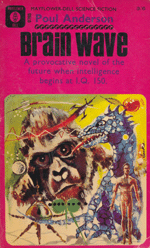|
Brain Wave
Copyright 1954 by
I first read this in 1968 and most recently on the 20th June 2004 For all of human history our planet has been immersed in a region of space wherein neuronal activity is dramatically inhibited. Now the Earth is drifting out of this intellectual clouding and almost overnight, every living thing on the planet becomes more intelligent, amazingly intelligent. Fabulous? Well not for everybody and certainly not immediately. Society will have to change to find a structure that will work to satisfy a population of geniuses, Peter and Sheila Corinth, Nathan Lewis, Felix Mandelbaum and Helga Arnulsen will have to find their own ways of adapting to the new world, and surviving in the meantime. The problem with writing a novel with super-intelligent people protagonists is how do you illustrate that? Can the author write a sufficiently brilliant dialogue, and would the reader understand it? Poul uses several techniques, two of which I thought were neat: he spends a lot of time describing the changes to the intellectually-challenged, dogs, younger brothers and other animals. Secondly new science and inventions burst forth from his gifted characters at an exhilarating rate. Boosting intelligence was a popular topic in the fifties and sixties. Medicine had advanced and there and the drug pharmacology was expanded by the new synthetics. It seemed reasonable that science would provide new modes or powers of thought. Look at Theodore Sturgeon's "More Than Human", Daniel Keyes "Flowers for Algernon" or John Brunner's "The stone That Never Came Down". Well nope, that's trite and wrong. Has there ever been a point when SF was any less concerned about mind expansion or development? I think not. Nowadays implants and internal mental speedups are more fashionable but of course it's always been an topic of immense interest. Nowadays, of course, I don't demand a medication to make me clever, just to stop the decline, and preferably pictorial instructions for its application. This was one of his first novels and was among those I most enjoyed. His later works got longer and more, well, feudal. And there were just to many books to decide which ones I had read and which I hadn't and whether this was a Lieutenant Flandry or another Polesotechnic League intrigue or just some Norse warriors fighting in the mud. However, it is a classic masterpiece of SF. Make a point of reading it. By the way, the 1977 ENL edition (and possibly later ones) includes an interesting preface by Brian Aldiss. Loaded on the 14th August 2005.
|
|






